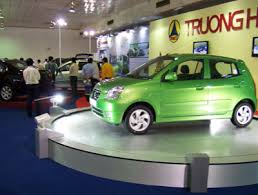The proliferation of compacts, luxury rides and SUVs has become a vivid symbol of Vietnam’s rising prosperity—and a conspicuous contributor to traffic jams. But VAMA members argue that the current regime of taxes and fees is short-sighted, and a stalled automobile industry will prove damaging to Vietnam’s economic future.
To attract more foreign investment to Vietnam’s auto industry, a reduction in taxes and fees on cars is needed, they said.
“Unlike other motor shows held in the past, this year many car-makers and car-importers registered to take part in the conference. They want to raise their voice in protesting government’s tax and fee policies imposed on the automotive industry,” exhibitor representative Tran Tan Trung said at a recent press conference heralding the event.


The Vietnam Motor Show 2012, scheduled for September 26-30 in Hanoi, as expected to be the largest exhibit of its kind ever in the nation, featuring a wide array of models.
Trung, also general director of Lien-A International Joint Stock Company, an official dealer of Audi brand models in Vietnam, said the organisers would invite policy-makers to the conference to hear suggestions from car-makers and car-importers.
Customers were reluctant to buy a vehicle, Charpentier said, because the registration fees at 15 per cent or 20 per cent in Ho Chi Minh City and Hanoi respectively were too high, and the planned annual fee to limit vehicle personal usage was unaffordable to most of the customers.
At this time, auto prices in Vietnam are about three times higher than it is in the United States, even though Vietnam remains a developing country with annual per capita income of around $1,300.
Policies that promote cars sales in Vietnam, Charpentier argued, would also promote Vietnam’s geographic position as a potential hub of the automotive industry in South Asia and favourable role in the global supply chain.
As it is, the precipitous tumble of auto sales was not only worrying automakers assembling vehicles in Vietnam but also deterring spare part suppliers from investing in this country, he added.
A representative of Toyota Vietnam, a subsidiary of Japan’s Toyota Motors Corporation, said car-makers and spare part suppliers could not further expand investment in Vietnam because of the current small scale of Vietnamese automotive market. In the case of Toyota Vietnam, the company is just assembling cars in a factory in northern Vinh Phuc province with localisation rate at around 10 per cent after 16 years of operations.
(Source: Talk Vietnam)